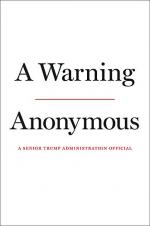
|
| Name: _________________________ | Period: ___________________ |
This test consists of 5 multiple choice questions, 5 short answer questions, and 10 short essay questions.
Multiple Choice Questions
1. What pen name did Alexander Hamilton, James Madison, and John Jay use in writing anonymous essays rebutting the criticism of the Constitution?
(a) Cicero.
(b) Plubius.
(c) Voter.
(d) Anonymous.
2. What is the title of Chapter 1?
(a) "Sanctions Are Coming."
(b) "The Deep State Grows."
(c) "Analysis of Character."
(d) "Collapse of the Steady State."
3. Among the quotes attributed to Donald Trump in Chapter 2, one of them attributes what to being "one of the greatest inventions of all times" (55)?
(a) The computer.
(b) The telephone.
(c) TiVo.
(d) The cell phone.
4. How many times has Donald Trump changed his political party over the last three decades, according to the author in Chapter 3?
(a) 1.
(b) 5.
(c) 3.
(d) 2.
5. When did Donald Trump make the statement to an audience in Iowa, "I like people who weren't captured" (3)?
(a) 2012.
(b) 2017.
(c) 2011.
(d) 2015.
Short Answer Questions
1. To whom is the following quote attributed? "No government, any more than an individual, will long be respected without being truly respectable; nor be truly respectable without possessing a certain portion of order and stability" (19).
2. Who was Donald Trump's second chief of staff?
3. On what date did Trump tweet: "We have defeated ISIS in Syria, my only reason for being there during the Trump Presidency" (19)?
4. When did President Trump suggest to aides that weapons be given to all of American's teachers so they could fight back against mass shooters?
5. What one-word tweet did President Trump post in response after the New York Times article by the author was published?
Short Essay Questions
1. To what does the author attribute the high rate of turnover in the Trump administration in Chapter 1?
2. How does the author describe the typical process of transition for an incoming president in Chapter 1?
3. Why does the author turn to Cicero in Chapter 2?
4. How does Trump's character demonstrate temperance or lack thereof, according to the author's assessment in Chapter 2?
5. What is the "truth" about Trump's border wall presented by the author in Chapter 3?
6. Why does the author present a number of crude statements by Donald Trump in Chapter 2?
7. Why does Trump claim to like "acting" officials?
8. To what does the author attribute Trump's fickleness of political party?
9. What does the "Saturday Night Massacre" refer to and why does the author describe it in the Introduction?
10. What was demonstrated through Trump's response to the "Unite the Right" violence?
|
This section contains 848 words (approx. 3 pages at 300 words per page) |

|




